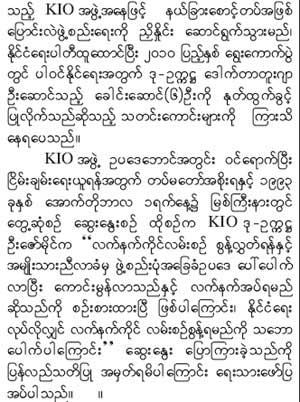All state-run media in military-ruled Burma have praised the recent resignation of six high ranking officers of the Kachin Independence Organization (KIO) for contesting the 2010 elections.
 The six KIO leaders' include Vice-president No. 2 Dr. Manam Tu Ja, who is for a peaceful political process. He decided to contest next year’s elections and was repeatedly praised by the junta-run daily newspapers The Kyaymon (The Mirror in English) and Myanmar Ahlin (The New Light of Myanmar in English) since early this week.
The six KIO leaders' include Vice-president No. 2 Dr. Manam Tu Ja, who is for a peaceful political process. He decided to contest next year’s elections and was repeatedly praised by the junta-run daily newspapers The Kyaymon (The Mirror in English) and Myanmar Ahlin (The New Light of Myanmar in English) since early this week.
The newspapers also applauded the rejection by the KIO and ethnic Kachin people resumption of civil war and accepting in principle the transformation of the KIO and its armed-wing the Kachin Independence Army (KIA) for the country's future as well as for solving the problems between the two sides with mutual trust for consolidating peace in the meeting in Laiza, the headquarters of KIO on Sino-Burma border in Kachin State on September 5.
Today the Myanmar Ahlin newspaper also reminded the KIO that General Mali Zup Zau Mai, the former deposed KIO President/Chairman was Vice-president, when he agreed with the junta on October 1, 1993 to abandon armed struggle, surrender weapons at an appropriate time after the drafting of the country's new constitution in the National Convention and come to an understanding on abandoning armed struggle if it wanted to take part in politics. Now, Mali Zup Zau Mai has no standing and is an ordinary person.
Actually, General Zau Mai's agreement mentioned in the newspaper was made before the junta and KIO officially signed a ceasefire agreement in Myitkyina, the capital of Kachin State on February 24, 1994.
According to the KIO's September 3 statement in Kachin language, only five KIO officers including Dr. Manam Tu Ja, Vice-president No.2 and N'Ja Naw Rip, deputy general secretary were authorized to resign from the KIO because they chose the peaceful political process and are preparing to contest the 2010 elections.
KIO's high ranking officers in Laiza headquarters told KNG, the KIO central committee decided and dismissed six high ranking officers on September 2, because they could have harmed the solidarity of the KIO and there could be factionalism in the organization.
The KIO approved the junta-conducted National Convention and the country's new constitution. However the KIO refused to transform KIA to the Burmese Army-controlled Border Guard Force (BGF) proposed by the junta in keeping with the junta-centric new constitution.
The KIO told the junta that it would like to change KIA to a self-governed Kachin Regional Guard Force at the brigade level and demanded direct participation of KIO's people in the new Kachin State government following the 2010 elections.
Regarding the BGF and the KIO's demands, KIO delegates and the ruling junta met seven times in Myitkyina, but the issue was not resolved, said KIO delegates.
Before the junta's deadline for all ethnic ceasefire groups in the country to transform their armed wings to BGFs expires on October 30, the KIO is being increasingly pressurized to transform its armed wing by the junta-run media since early this week.



